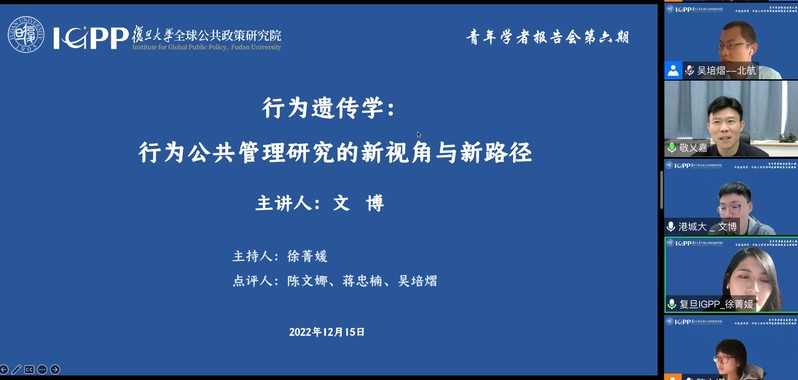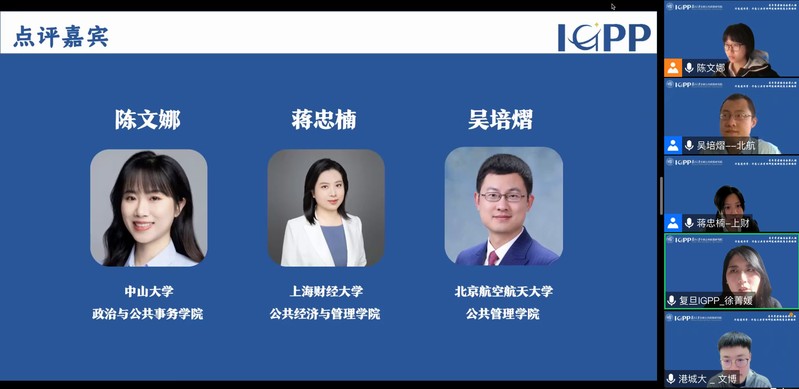Events



On December 15th, 2022, the Institute for Global Public Policy (IGPP) at Fudan University held its sixth Young Scholar Seminar online. The guest speaker Dr. Bo WEN, assistant professor of the Department of Public and International Affairs at the City University of Hong Kong, delivered a keynote lecture titled “Behavioral Genetics: A Novel Perspective and Approach for Behavioral Public Administration Research”. The organizer of this event also invited three emerging scholars as discussants. They are: Dr. Wenna CHEN from the School of Government at Sun Yat-sen University, Dr. Zhongnan JIANG from the School of Public Economics and Administration at the Shanghai University of Finance and Economics, and Dr. Peiyi WU from the School of Public Administration at the Beijing University of Aeronautics and Astronautics. Dr. Jingyuan XU, assistant professor at IGPP, moderated this seminar. More than 130 professors and students from domestic and overseas universities attended the lecture.

Kicking off the seminar with an overview of cutting-edge topics on behavioral public administration and behavioral genetics, Dr. WEN highlighted the necessity to incorporate the wisdom of behavioral genetics into the discipline of public administration. Such disciplinary integration and hybridization enable the following questions to be answered: What fresh perspectives can behavioral genetics bring to the study of public administration behavior? What mainstream methodological approaches in behavioral genetics are applicable to the domain of public administration? Can public administration research paradigms also promote the further development of behavioral genetics?

Dr. WEN then laid bare three novel perspectives through which scholars can draw inspirations from behavioral genetics in studying administrative behaviors, including: 1) whether individuals’ administrative behaviors are heritable, 2) how genes affect the development of certain administrative behaviors of interest, and 3) the mechanisms whereby the organizational/social environment interacts with genes to shape one’s administrative behaviors. He subsequently introduced three typical approaches to studying behavioral genetics, including the twin design, genetic scores, and the Mendelian randomization method. Noteworthily, Dr. WEN pointed out that the knowledge stemming from the public administration research could, in turn, promote the development of behavioral genetics by broadening its study subjects and scopes. He concluded his speech by offering a few pointers on how anonymous reviewers’ comments ought to be satisfactorily responded to in a peer-review process. These tips are extremely helpful to young scholars who are in quest of securing publications in top-tier journals.

Three discussants commended the originality of Dr. WEN’s research and made constructive comments on how Dr. WEN’s ongoing projects could better move forward. Their comments revolved around the concrete mechanisms underlying the interactions between the environment and genes, the credible measurement of genetic influences, and the generalizability/implications of the associated empirical findings. Dr. WEN addressed these comments with confidence and composure. He also had a heated discussion with the online participants on how his research along this line could be feasibly furthered. Dr. XU capped off the seminar by showing her sincere gratitude to Dr. WEN and discussants for supporting IGPP as well as by thanking the audience for participating in this event with zeal.